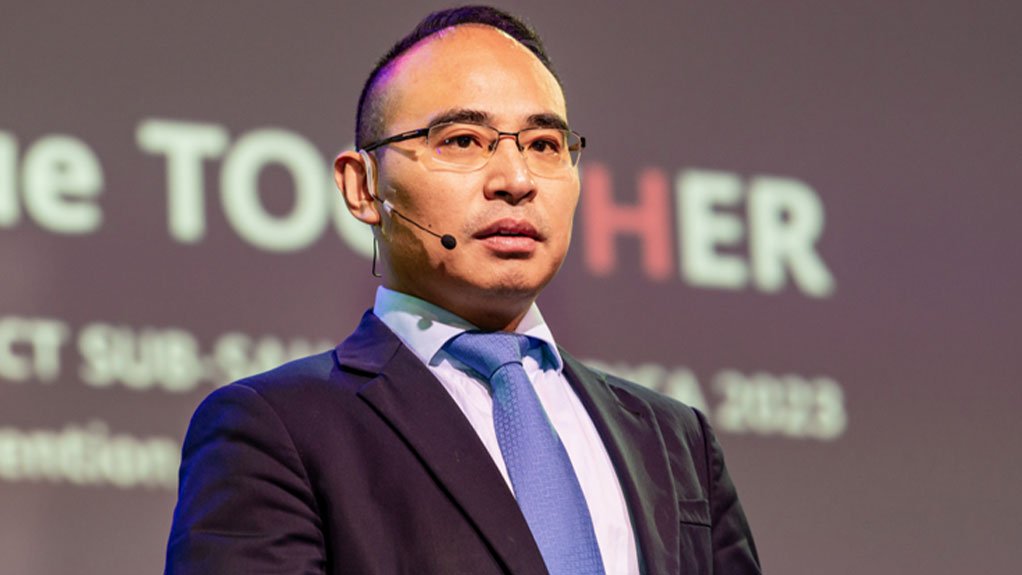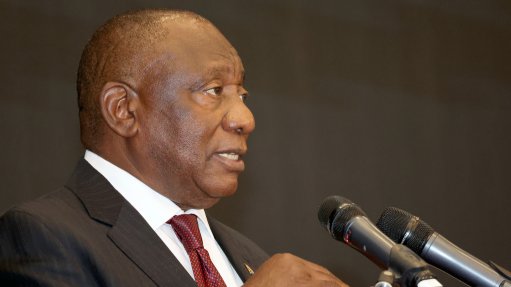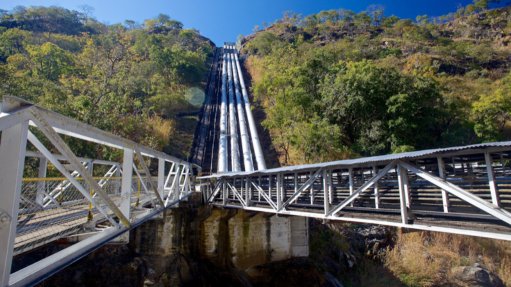The next wave of digitalisation will change African transportation forever
By Huawei Sub-Saharan Africa Enterprise Business President Guo Guoqing -
Africa’s transportation sector is on the cusp of a major transformation. Driven by technological advances in fields such as broadband, big data, artificial intelligence (AI), Internet of Things (IoT) and new energy, this transformation will have an especially profound impact on the continent’s railway networks.
Players across the transport sector share a common vision for services that are safe, green and efficient and which deliver high levels of customer satisfaction. This is necessary to build a comprehensive transportation system, across all logistic processes and transformation lifecycles. Digital transformation will accelerate all-round development but cannot be achieved without planning and an over-arching vision, even if sometimes it faces internal resistance to significant changes, due to the impact on existing employment.
Further complicating digital transformation within the transport sector is the fact that it is so diverse. That is true when it comes to transportation modes (land, water and air) and sub-industries (road, rail, aviation, shipping and logistics).
Nonetheless, there is significant appetite within the industry for the kind of digital transformation that brings different transportation modes together. Forrester Consulting conducted an in-depth survey on the current state of digital transformation in the global transportation industry: responses from the transport leaders it surveyed reveal that the three most important internal forces driving transformation are: improving customer and passenger experience (65%), enhancing business and IT agility (49%), and improving operational efficiency (46%).
“Most of the respondents agree that the future of transportation means breaking down the barriers between modes of transportation,” the survey report notes.
In business-to-consumer scenarios, that means providing passengers with a better door-to-door travel experience. In business-to-business scenarios, meanwhile, it is about providing cargo with a more efficient, trusted and predictable end-to-end transportation.
Small wonder then that many transportation enterprises are accelerating their digitalisation processes. Their current priorities include building digital cloud platform infrastructures (71%); applying digitalisation to improve the operation and service of transportation infrastructures (66%); improving the insight and analysis capabilities of business and operations data (61%); and enhancing the connection and sensing capabilities of transportation equipment (55%).
The key to supporting infrastructure transformation is broadband network, cloud, big data and AI technology, and most of those surveyed are deploying and expanding their deployment of these: 4G (95%), public cloud (87%), SaaS (72%), and private cloud (64%). In addition, more than 50% of the surveyed enterprises have deployed and are expanding IoT, hybrid cloud, optical network and other key technologies.
More and more discerning African business and technology leaders are embracing digital transformation in the transport sector. They also increasingly understand that digital transformation is not your typical technology implementation project. Instead, it impacts an organisation’s entire operating model, including strategy, processes, talent, metrics, organisational structure, and of course, technology.
This understanding and effective implementation of digital transformation within the transport sector will deliver more intelligent and comprehensive transportation. According to the Forrester survey, more than 80% of transportation leaders believe that smart transportation will make logistics transportation more efficient, for example, including smart tracking and status sensing. It will also offer passengers a more personalised and convenient transportation experience, enabling new digital transportation infrastructure that features connectivity and awareness across the entire lifecycle of transportation.
What the implementation of this digital transformation model looks like will vary from sub-industry to sub-industry. Railways, for instance, will look to increase safety by upgrading their equipment and enhancing their data collection capabilities. Railway digital transformation is a multi-year journey that needs the vision, leadership and support of the entire organisation from the CEO and executive leadership to the middle management and the rank-and-file employees.
Given everything that must come together for a successful digital transformation programme, it should not be surprising that executives seldom point to the technology itself as an obstacle. Instead, they believe that organisational culture structure (51%) and business-related issues (46%) are the primary problems during transformation – and headaches relating to data insight (46%), resources (37%), and technical capabilities (28%) still exist when implementing digital transformation.
Structure and culture are therefore the first things any transport enterprise should look at when implementing a digital transformation programme. After all, effective digital transformation requires a unified digital vision as well as an effective organisational structure and culture to execute on this vision, but the problem is that 73% of organisations believe their existing organisational structure can hardly support a comprehensive transformation (due to silos and lack of KPI alignment creating conflicts) and 65% believe they lack a compelling vision for digital transformation.
As a partner in the digital transformation process, Huawei can be helpful every step of the way. The prizes for getting digital transformation right are potentially massive too. Railway transportation, for example, helps transfer of goods and passengers more efficiently, more safely, at lower cost and offering a better experience. Traffic flows – of passengers and cargo – will be eased, with a focus on full-service architecture, full-lifecycle process and full-service value.
The new ecosystem can enable stakeholders to use different cooperation models, implementation planning, grassroots development or capabilities in software development, data governance and internet awareness.
But to achieve this business must:
Develop an overall strategic plan and phased implementation goals: with the understanding that economic value can be assessed from multiple dimensions, including internal management capability, customer and service experience quality, improvement of operational data analysis capability and optimisation of surrounding coordination mechanisms.
Establish an adaptive organisational structure: transforming from a traditional hierarchical structure to a flexible resource pool, which is subject to adjustment based on the supply and demand for refined services.
Support ecosystem platform construction through a unified architecture: adopting mature solutions that have been practiced multiple times in different scenarios and industries, as well as evaluating the universality of such solutions in upstream and downstream operations.
Achieve operations and innovation based on digital achievements: building a digital business platform that enables enterprises to gain more agile operational capabilities, save money and improve efficiency is needed.
Ultimately, successful digital transformation in the transport sector requires bringing business, technology and ecosystems together. That is significantly easier with a partner that deeply understands the technology, the industry and the demands of digital transformation onboard.
Huawei recently hosted the SARA Innovative Tour 2024 to explore the power of the resilient and innovative digital world from three perspectives: business, technology and ecosystems.
Featuring a series of activities – from keynote speeches to forums and roundtables – the SARA 2024 Conference is an open and inclusive platform that serves as the backdrop for in-depth, ambitious dialogue.
Article Enquiry
Email Article
Save Article
Feedback
To advertise email advertising@creamermedia.co.za or click here
Press Office
Announcements
What's On
Subscribe to improve your user experience...
Option 1 (equivalent of R125 a month):
Receive a weekly copy of Creamer Media's Engineering News & Mining Weekly magazine
(print copy for those in South Africa and e-magazine for those outside of South Africa)
Receive daily email newsletters
Access to full search results
Access archive of magazine back copies
Access to Projects in Progress
Access to ONE Research Report of your choice in PDF format
Option 2 (equivalent of R375 a month):
All benefits from Option 1
PLUS
Access to Creamer Media's Research Channel Africa for ALL Research Reports, in PDF format, on various industrial and mining sectors
including Electricity; Water; Energy Transition; Hydrogen; Roads, Rail and Ports; Coal; Gold; Platinum; Battery Metals; etc.
Already a subscriber?
Forgotten your password?
Receive weekly copy of Creamer Media's Engineering News & Mining Weekly magazine (print copy for those in South Africa and e-magazine for those outside of South Africa)
➕
Recieve daily email newsletters
➕
Access to full search results
➕
Access archive of magazine back copies
➕
Access to Projects in Progress
➕
Access to ONE Research Report of your choice in PDF format
RESEARCH CHANNEL AFRICA
R4500 (equivalent of R375 a month)
SUBSCRIBEAll benefits from Option 1
➕
Access to Creamer Media's Research Channel Africa for ALL Research Reports on various industrial and mining sectors, in PDF format, including on:
Electricity
➕
Water
➕
Energy Transition
➕
Hydrogen
➕
Roads, Rail and Ports
➕
Coal
➕
Gold
➕
Platinum
➕
Battery Metals
➕
etc.
Receive all benefits from Option 1 or Option 2 delivered to numerous people at your company
➕
Multiple User names and Passwords for simultaneous log-ins
➕
Intranet integration access to all in your organisation




















